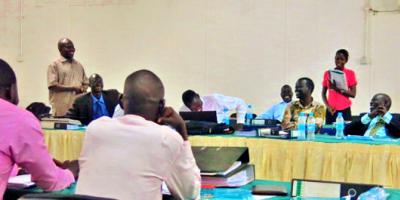
Two years after becoming the world’s newest nation in 2011, South Sudan was plunged into fresh fighting. The conflict between government and rebel forces has displaced at least one-and-half million people. Some two-and-a-half million are facing severe food shortages.
Hopes are now pinned on both sides signing a final peace agreement by 5th March and abiding by the commitments made in January to end the conflict. Many subjects, like transitional security, governance, economic reform and justice, have still to be agreed. If a deal is reached, then a new, transitional government could be formed later this year.
But if the rule of law is to prove itself a cornerstone upon which lasting peace and security in South Sudan can be built, much work remains to be done.
This is not least because the new state had adopted English as its official language, and common law as its new legal system. Many of those practising law and working in the judiciary in South Sudan today were trained in Arabic under old Sudan's shari’a-based, civil law system. They lack the language skills to practise in English. This has caused bottlenecks in the courts, impeding the delivery of justice.
IDLO has been working in the country to retrain legal and justice sector professionals, allowing them to operate effectively within the newly-adopted legal system. Following on from our work with South Sudan's trial judges, we have trained almost a third of the country's judicial assistants, and have just begun building the capacity of more than 100 entry-level lawyers, from both the government and private sector. The five-week training will equip them with the specific legal knowledge, practical skills and English language competency to improve their legal practice.
Adut Daniel Choel, a female trainee advocate on the General Orientation and Legal Practice course, said it was ‘really helping us understand the procedures to apply as an advocate’. Fellow student David Jerome Kumbo described the training as crucial to efforts to improve the rule of law in South Sudan.
At a ceremony to mark the start of the course, Jeremiah Swaka Wani Moses, the Undersecretary for the Ministry of Justice, thanked IDLO for collaborating not only with the governmental rule of law institutions, but also for building the capacity of professional bodies such as the South Sudan Bar Association.

